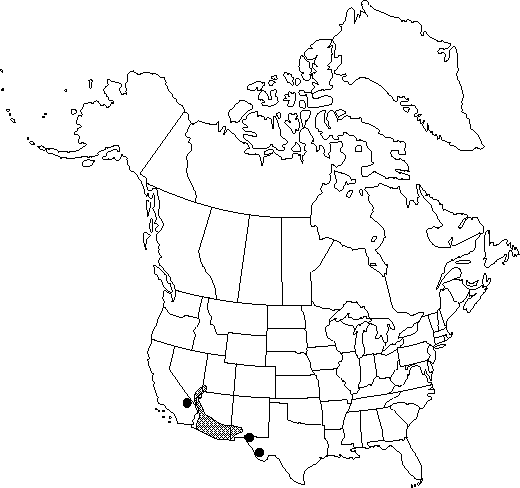familyPapaveraceae
genusEschscholzia
speciesEschscholzia californica
subspeciesEschscholzia californica subsp. mexicana
Difference between revisions of "Eschscholzia californica subsp. mexicana"
Syst. Bot. 3: 382. 1978.
Basionym: Eschscholzia mexicana Greene Bull. Calif. Acad. Sci. 1: 69. 1885
Treatment appears in FNA Volume 3.
FNA>Volume Importer |
imported>Volume Importer |
||
| (7 intermediate revisions by 2 users not shown) | |||
| Line 7: | Line 7: | ||
|year=1978 | |year=1978 | ||
}} | }} | ||
| − | |basionyms={{Treatment/ID/ | + | |basionyms={{Treatment/ID/Basionym |
|name=Eschscholzia mexicana | |name=Eschscholzia mexicana | ||
|authority=Greene | |authority=Greene | ||
| + | |rank=species | ||
| + | |publication_title=Bull. Calif. Acad. Sci. | ||
| + | |publication_place=1: 69. 1885 | ||
}} | }} | ||
|synonyms= | |synonyms= | ||
| Line 19: | Line 22: | ||
}}<!-- | }}<!-- | ||
| − | --><span class="statement" id="st- | + | --><span class="statement" id="st-undefined" data-properties=""><b>Plants </b>annual; cotyledons unlobed. <b>Flowers</b>: receptacular cup with spreading rim often inconspicuous. <b>2n</b> = 12.</span><!-- |
-->{{Treatment/Body | -->{{Treatment/Body | ||
|phenology=Flowering mid winter–late summer (Feb–Sep). | |phenology=Flowering mid winter–late summer (Feb–Sep). | ||
|habitat=Deserts | |habitat=Deserts | ||
| − | |elevation= | + | |elevation=0–2000 m |
| − | |distribution=Ariz.;Calif.;N.Mex.;Nev.;Tex.;Utah;Mexico (Sonora) | + | |distribution=Ariz.;Calif.;N.Mex.;Nev.;Tex.;Utah;Mexico (Sonora). |
|discussion=<p>C. T. Mason Jr. (pers. comm.) has noted several specimens from Arizona as far east as Cochise County that appear to be perennial.</p> | |discussion=<p>C. T. Mason Jr. (pers. comm.) has noted several specimens from Arizona as far east as Cochise County that appear to be perennial.</p> | ||
|tables= | |tables= | ||
| Line 35: | Line 38: | ||
-->{{#Taxon: | -->{{#Taxon: | ||
name=Eschscholzia californica subsp. mexicana | name=Eschscholzia californica subsp. mexicana | ||
| − | |||
|authority=(Greene) C. Clark | |authority=(Greene) C. Clark | ||
|rank=subspecies | |rank=subspecies | ||
| Line 44: | Line 46: | ||
|phenology=Flowering mid winter–late summer (Feb–Sep). | |phenology=Flowering mid winter–late summer (Feb–Sep). | ||
|habitat=Deserts | |habitat=Deserts | ||
| − | |elevation= | + | |elevation=0–2000 m |
| − | |distribution=Ariz.;Calif.;N.Mex.;Nev.;Tex.;Utah;Mexico (Sonora) | + | |distribution=Ariz.;Calif.;N.Mex.;Nev.;Tex.;Utah;Mexico (Sonora). |
|reference=None | |reference=None | ||
|publication title=Syst. Bot. | |publication title=Syst. Bot. | ||
|publication year=1978 | |publication year=1978 | ||
|special status= | |special status= | ||
| − | |source xml=https:// | + | |source xml=https://bitbucket.org/aafc-mbb/fna-data-curation/src/2e0870ddd59836b60bcf96646a41e87ea5a5943a/coarse_grained_fna_xml/V3/V3_741.xml |
|genus=Eschscholzia | |genus=Eschscholzia | ||
|species=Eschscholzia californica | |species=Eschscholzia californica | ||
|subspecies=Eschscholzia californica subsp. mexicana | |subspecies=Eschscholzia californica subsp. mexicana | ||
| − | |||
| − | |||
| − | |||
| − | |||
| − | |||
}}<!-- | }}<!-- | ||
-->[[Category:Treatment]][[Category:Eschscholzia californica]] | -->[[Category:Treatment]][[Category:Eschscholzia californica]] | ||
Latest revision as of 21:51, 5 November 2020
Plants annual; cotyledons unlobed. Flowers: receptacular cup with spreading rim often inconspicuous. 2n = 12.
Phenology: Flowering mid winter–late summer (Feb–Sep).
Habitat: Deserts
Elevation: 0–2000 m
Distribution

Ariz., Calif., N.Mex., Nev., Tex., Utah, Mexico (Sonora).
Discussion
C. T. Mason Jr. (pers. comm.) has noted several specimens from Arizona as far east as Cochise County that appear to be perennial.
Selected References
None.
Lower Taxa
None.